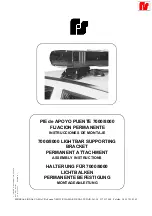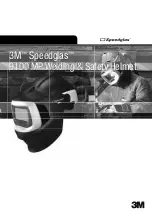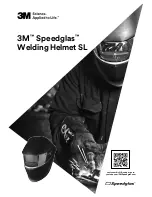
Regular and unscheduled maintenance
Adhering to the following maintenance intervals will ensure that the product you have purchased remains in perfect condition.
The awning fabric should be thoroughly checked twice a year, before and after the summer season, for any cracks or damage
to the seams: in the spring before the beginning of the summer season and in the autumn before winter storage, and once a
year before the summer season. Lubricate the moving parts with silicone oil:
F
Axle mounts of the drop-arms
F
Axle mount of the awning shaft
All unscheduled maintenance work must be carried out by qualified personnel. If the awning or parts thereof need to be
removed, see the installation and assembly instructions. Only use genuine spare parts. Failure to do so will void the warranty.
To order spare parts, please contact your dealer.
CAUTION!
All regular or unscheduled maintenance work must be carried out under completely safe conditions. Read the
"Safety" chapter on page 7 carefully before putting the retractable awning into operation. Thanks to the high quality of the
materials used, the clamping awning does not require any particular regular maintenance, apart from possibly cleaning the
fabric to prevent mould due to the accumulation of dust or other debris, please also refer to the "Cleaning" chapter of the
clamping awning manual. This can be done using a vacuum cleaner or a sponge/cloth and lukewarm water. Allow the fabric to
dry thoroughly after cleaning.
CAUTION!
Do not use ammonia- or hydrocarbon-based solvents. Roll up the awning and stop just before you reach the end.
Clean the unrolled part (approx. 20 cm) and the overhang with a vacuum cleaner or broom with an extension tube to avoid
using a ladder (see notes below for details on the various types of material). Clean the visible side of the awning fabric from
below, then roll out the clamp awning another 10-15 cm and clean the newly exposed section. Proceed in the same manner
until the entire awning has been cleaned.
Cleaning with ladders, mobile scaffolding and other devices is only permitted for specialist personnel who must comply with
the relevant safety regulations (Presidential Decree 164 - Legislative Decree 626 - Legislative Decree 494) and use personal
protective equipment such as safety belts with safety rope.
Despite the high quality of the weaving techniques, the fabric treatment and the finishing, the clamping awning fabrics may be
subjected to the following:
1. MOULD:
Due to the high concentration of pollutants in the atmosphere and the resulting acid rain as well as the
location of the clamping awning near roads, ventilation openings or tall trees that release resin and other substances,
a large number of microorganisms can accumulate in the awning fabric if not cleaned properly, despite the anti-fungal
treatment, so that it is no longer possible to clean it completely. The waterproofing of waterproof and printed fabric or
PVA fabric is only guaranteed if there is no mould growth.
2. CREASES/SPIDER'S WEB EFFECT
may form during packaging of the material. These creases leave darker stripes on
the fabric, especially on light colours, but this does not impair the quality of the clamping awning.
3. WAVES:
may occur at the seams of the edges and are caused by the double layer of the fabric, which is exposed to
different stresses during winding.
4. FRAYING AND ABRASION:
fraying and signs of wear and abrasion may occur if the overhang is exposed to
continuous and strong wind. IMPORTANT The phenomena described under points 1 - 4 are not product defects and
are therefore not covered by the guarantee.
NOTE!
WARNING!
Maintenance
50
V1/2019-EM-H023






































